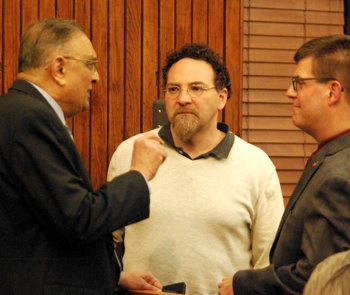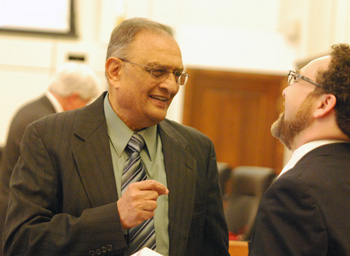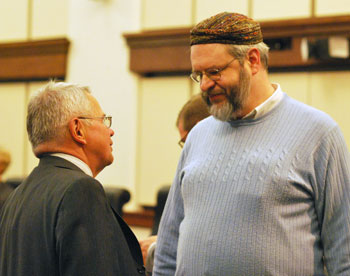Equalization Report Shows Stronger Economy
Washtenaw County board of commissioners meeting (April 16, 2014): Most local governments in Washtenaw County will see increases in tax revenue this year, according to the 2014 equalization report that county commissioners approved on April 16.

From left: Washtenaw County equalization director Raman Patel with commissioners Conan Smith (D-District 9) and Dan Smith (R-District 2) at the April 16, 2014 board of commissioners meeting. (Photos by the writer.
The report was presented by Raman Patel, the county’s long-time equalization director. “Washtenaw County is showing improvements in the market,” he told commissioners. “We are slowly regaining our county’s equalized base. It appears that the worst part of the decline in market value is behind us.”
For 2014, taxable value in the county increased 2.02% to $14.18 billion. That’s a greater increase than the 1.68% climb in 2013, and an improvement over declines seen in recent years. Patel cautioned that several factors are impacting revenue for local governments, including the phase-out of personal property taxes, a variety of exemptions, and tax capture from entities like downtown development authorities.
More of the tax burden is also being shifted to residential property owners, he noted, compared to other categories, like commercial property. The category of residential property accounts for 67.34% of total property value in the county. Five years ago, in 2009, it was 63%.
In other action on April 16, commissioners gave initial approval to distribute proceeds from a countywide tax on hotels and other accommodations. For 2013, $472,846 was available for distribution. If the resolution is given final approval, the county will keep 10% ($47,285) to pay for enforcement of the accommodation ordinance. The remainder will be divided between the Ann Arbor Convention & Visitors Bureau ($319,171) and the Ypsilanti Convention & Visitors Bureau ($106,390).
During public commentary, Mary Kerr, president of the Ann Arbor Convention & Visitors Bureau, and Jason Morgan, director of government relations for Washtenaw Community College, highlighted the union training programs that will be coming to the area this summer. The CVBs have been instrumental in recruiting these kinds of events to Washtenaw County.
Commissioners also gave initial approval to the annual Urban County action plan, which outlines proposed projects funded by the U.S. Dept. of Housing and Urban Development. The Urban County is a consortium of Washtenaw County and 18 local municipalities that receive federal funding for low-income neighborhoods. Members include the cities of Ann Arbor, Ypsilanti and Saline, and 15 townships.
Final authorization was given to a two-year pricing proposal – for 2016 and 2017 – to provide police services to local municipalities through contracts with the county sheriff’s office. And commissioners gave final approval to a new brownfield redevelopment plan for the Thompson Block in Ypsilanti’s Depot Town.
In other action, the board passed a resolution declaring April 13-19 as National Public Safety Telecommunicator Week in Washtenaw County. They also honored Dr. Eugene Glysson, who had served on the county’s board of public works (BPW) since 1986, and was its chair since 1996. He died on April 2.
Several issues were raised during public commentary, including concerns about emergency sirens installed by a pasture in Scio Township. The owner told commissioners that the sirens spook his horses, causing a dangerous situation if anyone is riding them or standing nearby. Other topics discussed by the public included the creation of a new group to help end homelessness, called Our 2020 Vision, and efforts by University of Michigan students to reduce the use of plastic bags by imposing a per-bag usage fee. They’re garnering support in part through a MoveOn.org petition. [Full Story]







